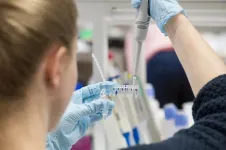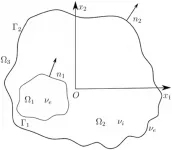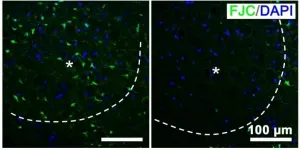INFORMATION:
Why bipolar patients don't take their meds
2021-05-19
(Press-News.org) People with bipolar disorder may not take their medication because of side effects, fear of addiction and a preference for alternative treatment - according to research from Norfolk and Suffolk NHS Foundation Trust (NSFT) and the University of East Anglia (UEA).
Nearly half of people with bipolar disorder do not take their medication as prescribed leading to relapse, hospitalisation, and increased risk of suicide.
A new study, published today, reveals six key factors that stop people taking their medication as prescribed.
These include whether they are experiencing side effects, difficulties in remembering to take medication and a lack of support from family, friends and healthcare professionals.
A patient's own beliefs and knowledge about bipolar disorder and its treatment was also found to affect whether or not they take their meds, as well as fear of addiction, and a preference for alternative treatment.
The new study comes from a team of pharmacists, psychiatrists, and experts in behavioural science from NSFT, UEA, Devon Partnership Trust, and the University of Lyon.
Asta Ratna Prajapati, consultant pharmacist at NSFT and a post-graduate researcher at UEA's School of Pharmacy, led the research. The study was funded by a Health Education England (HEE) / National Institute for Health Research Clinical Doctoral Research Fellowship.
He said: "Bipolar disorder is a mental health condition that causes extreme mood swings that include emotional highs, known as mania or hypomania, and depressive lows.
"Around half of people with bipolar disorder don't take their medication which can lead to a relapse of symptoms. And this can have a knock-on impact with problems at work, strained relationships with family and friends, hospitalisation, and an increased risk of suicide.
"We wanted to better understand what stops people from taking their medication."
The research team looked at the evidence for what hinders people taking their medication for bipolar disorder. The research team carried out a systematic review and included 57 studies, mostly surveys and interviews, involving 32894 patients and healthcare professionals. The majority (79 per cent) of the studies were conducted in the USA and Europe.
"We found six key factors that affect whether people take their medication. The main reason being what the medication is like, whether there are side effects, and whether it works," said Prajapati.
"Secondly, we found that a patient's beliefs and knowledge about bipolar disorder and its treatment could stop them taking medication.
"We also found that how patients felt taking their medication had an impact - for example a fear of addiction or worry about negative side effects.
"Other factors included a lack of support, difficulty remembering taking medication and not wanting to take it for reasons including preferring alternative treatment.
"We recommend that the prescribers talk to patients about their thoughts and experiences of the medications they take, paying particular attention to these issues which may stop patients taking their meds."
The research team are now developing a tool to identify people who struggle to take their medication and their individual reasons. They hope it will help prescribers and patients work together and offer bespoke support to make medication taking easier.
'Mapping modifiable determinants of medication adherence in bipolar disorder (BD) to the theoretical domains framework (TDF): a systematic review is published in the Psychological Medicine Journal on May 19, 2021.
ELSE PRESS RELEASES FROM THIS DATE:
A protein modification of MECP2 can convey neuroprotection under inflammation
2021-05-19
Researchers at the University of Eastern Finland have found a potential neuroprotective effect of a protein modification that could be a therapeutic target in early Alzheimer's disease. The new study investigated the role of MECP2, a regulator of gene expression, in Alzheimer's disease related processes in brain cells. The study found that phosphorylation of MECP2 protein at a specific amino acid decreases in the brain as Alzheimer's disease is progressing. Abolishing this phosphorylation of MECP2 in cultured mouse neurons upon inflammatory stimulation enhanced their viability and ...
Pancreatic cancer: Mechanisms of metastasis
2021-05-19
A study led by MedUni Vienna (Institute of Cancer Research and Comprehensive Cancer Center Vienna) sheds light on the mechanisms that lead to extremely aggressive metastasis in a particular type of pancreatic cancer, the basal subtype of ductal adenocarcinoma. The results contribute to a better understanding of the disease. The study has recently been published in the leading journal "Gut".
The most prevalent form of pancreatic cancer, Pancreatic Ductal AdenoCarcinoma (PDAC) is usually divided into two subtypes, a classical subtype and a basal subtype. The latter is highly aggressive and tends towards early metastasis. One of the distinguishing features between the two subtypes is that the classical subtype exhibits the protein GATA6. This is no longer present ...
Groundwater monitoring with seismic instruments
2021-05-19
Water in the high-mountain regions has many faces. Frozen in the ground, it is like a cement foundation that keeps slopes stable. Glacial ice and snow supply the rivers and thus the foothills with water for drinking and agriculture during the melt season. Intense downpours with flash floods and landslides, on the other hand, pose a life-threatening risk to people in the valleys. The subsoil with its ability to store water therefore plays an existential role in mountainous regions.
But how can we determine how empty or full the soil reservoir is in areas that are difficult to access? Researchers at the German Research Centre for Geosciences (GFZ), together with colleagues from Nepal, have now demonstrated an elegant method to track groundwater dynamics in high ...
Single fingerprint at a crime scene detects class A drug usage
2021-05-19
The latest findings show that with clever science, a single fingerprint left at a crime scene could be used to determine whether someone has touched or ingested class A drugs.
In a paper published in Royal Society of Chemistry's Analyst journal, a team of researchers at the University of Surrey, in collaboration with the National Centre of Excellence in Mass Spectrometry Imaging at the National Physical Laboratory (NPL) and Ionoptika Ltd reveal how they have been able to identify the differences between the fingerprints of people who touched cocaine compared with those who have ingested the drug - even if the hands are not washed. The smart science behind the advance is the mass spectrometry imaging tools applied to the detection of cocaine ...
Research of microring lasers shows prospects of optical applications in electronics
2021-05-19
Problems for eigenmodes of a two-layered dielectric microcavity have become widespread thanks to the research of A.I. Nosich, E.I. Smotrova, S.V. Boriskina and others since the beginning of the 21st century. The KFU team first tackled this topic in 2014; undergraduates started working under the guidance of Evgeny Karchevsky, Professor of the Department of Applied Mathematics of the Institute of Computational Mathematics and Information Technology.
In this paper, the researchers discuss a model of a 2D active microcavity with a piercing hole and the possibility of a compromise between high directionality of radiation ...
How a small fish coped with being isolated from the sea
2021-05-19
The last ice age ended almost 12 000 years ago in Norway. The land rebounded slowly as the weight of the ice disappeared and the land uplift caused many bays to become narrower and form lakes.
Fish became trapped in these lakes.
Sticklebacks managed to adapt when saltwater became freshwater, and they can still be found in today's coastal lakes along the Norwegian coast.
Saltwater gradually changed to brackish water and later to freshwater. This environmental change naturally led to a total replacement of the animal and plant life.
The exception is the tiny stickleback, which successfully adapted as saltwater became freshwater and ...
Parkinson's patients are particularly affected by COVID-19
2021-05-19
A reason for these findings could be due to the fact that Parkinson's patients often also have many risk factors for a severe course of Covid-19. For the first time, the cross-sectional study provides detailed nationwide data. The research team led by Professor Lars Tönges reports in the journal Movement Disorders of 4 May 2021.
Nationwide analysis of hospital data
The team headed by Lars Tönges has analysed data on Parkinson's treatment in 1,468 hospitals. The data were taken from nationwide databases in which information on the treated diseases and of treatments carried out in hospitals is publicly collected, for example by the Institute for the Hospital Remuneration System or the Federal Statistical Office.
A comparison between the period of the first ...
An illuminating possibility for stroke treatment: Nano-photosynthesis
2021-05-19
Blocked blood vessels in the brains of stroke patients prevent oxygen-rich blood from getting to cells, causing severe damage. Plants and some microbes produce oxygen through photosynthesis. What if there was a way to make photosynthesis happen in the brains of patients? Now, researchers reporting in ACS' Nano Letters have done just that in cells and in mice, using blue-green algae and special nanoparticles, in a proof-of-concept demonstration.
Strokes result in the deaths of 5 million people worldwide every year, according to the World Health Organization. Millions more survive, but they often experience disabilities, such as difficulties with speech, swallowing or memory. The most common cause is a blood vessel blockage in the brain, and the best way to ...
New report indicates annual economic impact of human genetics/genomics
2021-05-19
WASHINGTON, DC (May 19, 2021) - Human genetics and genomics contributed $265 billion to the U.S. economy in 2019 and has the potential to drive significant further growth given major new areas of application, according to a new report issued today by the American Society of Human Genetics (ASHG). The findings indicate that this research and industry sector has seen its annual impact on the U.S. economy grow five-fold in the last decade and outlined at least eight areas of expanding impact for human health and society. ASHG commissioned and funded the report and is grateful for generous additional contributions from Invitae and Regeneron. ...
New, biological, and safer soaps
2021-05-19
An international research team led by Professor Charles Gauthier from the Institut national de la recherche scientifique (INRS) has discovered a new molecule with potential to revolutionize the biosurfactant market. The team's findings have been published in Chemical Science, the Royal Society of Chemistry's flagship journal.
Surfactants are synthesized from petroleum and are the main active ingredient in most soaps, detergents, and shampoos. Biosurfactants, produced by bacteria, are safer and can replace synthetic surfactants.
Rhamnolipid molecules are some ...






